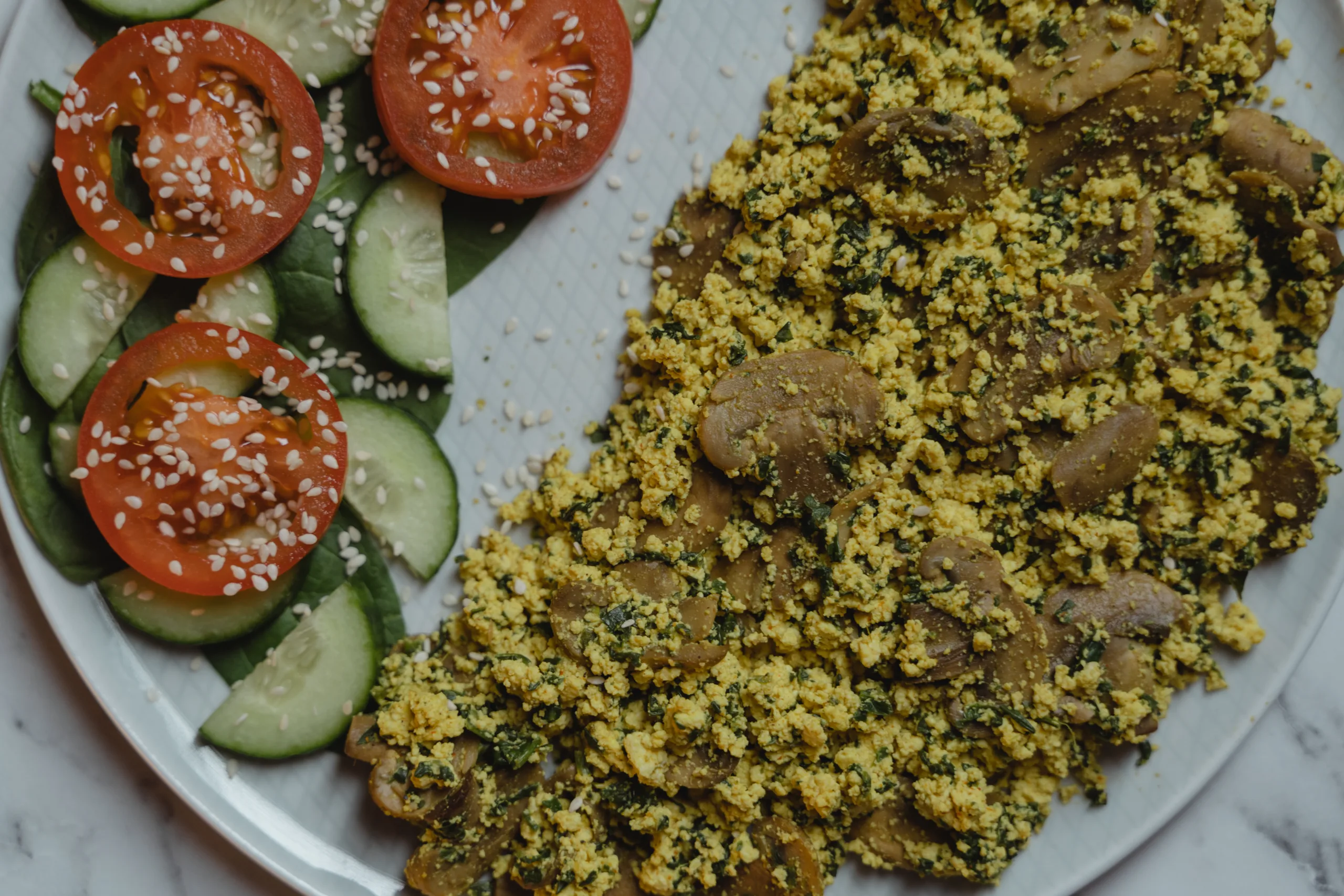Are you following a low FODMAP diet and wondering whether cucumbers are suitable?
If so, you’re in the right place! This article will explain everything you need to know about cucumbers, including their FODMAP content, nutrition facts, and other potential health benefits. You’ll also get tips on how to incorporate cucumbers into your low FODMAP diet.
By the end of this article, you’ll have a better understanding of whether cucumbers are suitable for your low FODMAP diet. Let’s get started!
Yes, cucumbers are low FODMAP. They contain very small amounts of fructans and are considered safe to eat in servings of 1/2 cup or 75 grams.
The FODMAP Diet
The FODMAP diet is an elimination diet that has been designed to reduce symptoms of irritable bowel syndrome (IBS). It works by reducing the intake of foods that contain certain carbohydrates known as FODMAPs. These include fructose, lactose, fructans, galactans, and polyols. By limiting these types of carbohydrates in the diet, it may help to reduce the symptoms of IBS such as bloating, abdominal pain, diarrhea and constipation.
FODMAPs are found in many types of food including grains, fruits and vegetables, dairy products and processed foods. Some people with IBS may be sensitive to these types of carbohydrates and may experience symptoms when they are eaten. The FODMAP diet eliminates all high-FODMAP foods from the diet for a period of time and then gradually reintroduces them one at a time to identify which types cause symptoms.
While the FODMAP diet may be beneficial for some people with IBS, it is important to note that it is not suitable for everyone. It should only be followed under the guidance of a qualified medical professional or dietitian. Additionally, it is important to ensure you are getting enough essential nutrients while following this type of elimination diet.
Low FODMAP Diet
The Low FODMAP Diet is a dietary plan that is designed to help individuals who are suffering from digestive issues such as irritable bowel syndrome (IBS). It was developed by researchers at Monash University in Australia and is now recommended by gastroenterologists around the world. The diet works by avoiding foods that contain fermentable oligosaccharides, disaccharides, monosaccharides and polyols (FODMAPs). These carbohydrates are found in certain fruits, vegetables, grains and dairy products and can be difficult to digest for people with IBS. By avoiding these foods, it can help reduce symptoms such as bloating, abdominal pain and diarrhea.
The Low FODMAP Diet consists of three phases: elimination, reintroduction and maintenance. During the elimination phase, all high FODMAP foods are avoided for a period of up to 8 weeks. This allows the gut to rest and heal before introducing new foods back in. The reintroduction phase involves slowly adding back in high FODMAP foods one at a time to identify which ones cause symptoms. Finally, the maintenance phase focuses on finding a balance of high and low FODMAP foods that allow for symptom control without feeling restricted.
Click here to preview your posts with PRO themes ››
Overall, the Low FODMAP Diet can be an effective way to reduce digestive symptoms for individuals with IBS. However, it is important to work with a dietitian or health care provider who can provide guidance on how to properly follow the diet. Additionally, it may be beneficial for individuals with IBS to also consider other dietary changes such as eliminating certain food groups or following an anti-inflammatory diet.
What are FODMAPs and How Do They Affect IBS?
FODMAPs stands for Fermentable Oligosaccharides, Disaccharides, Monosaccharides and Polyols. These are a group of short-chain carbohydrates found in certain foods that can be difficult to digest. People with Irritable Bowel Syndrome (IBS) often have difficulty digesting FODMAPs, which can trigger symptoms such as bloating, abdominal pain, flatulence and diarrhea.
FODMAPs are found in a wide range of foods, including wheat, rye, garlic, onion, beans and some milk products. While these foods may be healthy for most people to eat, for those with IBS they can cause significant digestive discomfort. Cutting down on FODMAPs in the diet has been shown to be an effective way to manage IBS symptoms.
A low-FODMAP diet involves removing or reducing high-FODMAP foods from the diet for up to eight weeks at a time. During this time period it is important to focus on eating nutrient-dense whole foods that are low in FODMAPs such as lean proteins, fruits and vegetables. After the initial period of elimination it is possible to slowly reintroduce some high-FODMAP food into the diet in order to identify any potential triggers.
For those with IBS who want to manage their symptoms naturally, a low-FODMAP diet can be an effective option. However it is important to consult with a healthcare practitioner before making any major changes to your diet as not all cases of IBS respond well to this approach.
Are All Cucumbers Low FODMAP?
Cucumbers are one of the most popular vegetables, often seen in salads and sandwiches. They are also considered low FODMAP, but not all cucumbers are created equal. Depending on the variety, some cucumbers may contain more FODMAPs than others. It is important to choose the right type of cucumber when following a low FODMAP diet.
Granny Smith cucumbers are considered low FODMAP, but other varieties such as Persian and English cucumbers may contain higher amounts of Fructans and Galactans. When choosing a cucumber for a low FODMAP diet, it is best to stick with Granny Smith or seedless varieties.
The good news is that even if you do choose a variety that contains more FODMAPs than others, there is no need to avoid them completely. You can still enjoy cucumbers in moderation by limiting your portion size to 1/2 cup per serving. This will help ensure that you don’t consume too many FODMAPs in one sitting.
Click here to preview your posts with PRO themes ››
Remember, the key to success when following a low FODMAP diet is moderation and portion control. By making sure you pick the right type of cucumber and eat it in moderation, you can still enjoy this delicious vegetable without worrying about triggering your IBS symptoms.

Eating Cucumbers on a Low-FODMAP Diet
Cucumbers are a tasty, refreshing and nutritious addition to any meal and luckily, they are also low in FODMAPs. This makes them a great option for those following a low-FODMAP diet. Here are some tips for eating cucumbers on a low-FODMAP diet:
Firstly, it is important to choose cucumbers that are firm and have an even green colour all over. Avoid any cucumbers that have wrinkly skin or soft spots as these may be spoiled. When preparing cucumbers, it is best to use a vegetable peeler to remove the skin before eating. This will help reduce the amount of FODMAPs present in the cucumber.
It is also important to limit how much cucumber you consume at once. According to Monash University, one serving of cucumber should be no more than one cup (150 grams). Eating too much of this vegetable can trigger digestive symptoms for those with IBS.
Finally, it is important to consider how you prepare your cucumbers before eating them. To limit FODMAPs, it is best to avoid adding high-FODMAP ingredients such as garlic or onion when cooking or preparing your cucumbers. Additionally, it is also important to avoid using dips or dressings that contain high-FODMAP ingredients such as honey or agave syrup.
By following these tips, you can enjoy cucumbers on a low-FODMAP diet without triggering digestive symptoms. With some careful preparation and moderation in portion size, you can easily incorporate this tasty vegetable into your meals.
Foods to Avoid When on a Low-FODMAP Diet
Eating a low-FODMAP diet can help alleviate the symptoms of irritable bowel syndrome (IBS) and other digestive disorders. FODMAPs are certain types of carbohydrates that are poorly absorbed in the small intestine, leading to an increase in fluid in the intestines and subsequent abdominal pain, bloating, and gas. To reduce these symptoms, it is important to avoid foods that are high in FODMAPs.
Foods that should be avoided on a low-FODMAP diet include wheat, barley, rye, onions, garlic, beans and legumes, dairy products (such as milk, yogurt and cheese), certain fruits (such as apples and pears), certain vegetables (such as artichokes and mushrooms), honey, agave nectar, high-fructose corn syrup, sorbitol and mannitol. It is also important to avoid processed foods that contain any of these ingredients.
In addition to avoiding foods with high FODMAP content, it is important to eat in moderation. Eating too much of any food can cause digestive discomfort regardless of its FODMAP content. Eating smaller meals more frequently can also help reduce digestive symptoms by allowing the body time to digest food properly before consuming more.
Click here to preview your posts with PRO themes ››
Finally, it is important to keep track of the foods you eat while following a low-FODMAP diet so you can determine which ones cause adverse reactions. Keeping a food diary can be helpful in this regard by providing evidence of which foods may be causing problems so they can be avoided or limited in future meals.
Can You Eat Cucumbers if You Have IBS?
IBS, or Irritable Bowel Syndrome, is a digestive disorder that can cause abdominal pain, cramping, bloating, gas, diarrhea and constipation. People who suffer from IBS may need to adjust their diet in order to manage their symptoms. But can you eat cucumbers if you have IBS?
The answer is yes—cucumbers are generally safe to eat for people with IBS. Cucumbers are low in FODMAPs (Fermentable Oligosaccharides Disaccharides Monosaccharides and Polyols), which are carbohydrates that can cause uncomfortable digestive symptoms in people with IBS. This means that cucumbers can be a great addition to an IBS-friendly diet.
Cucumbers are also high in water and fiber, both of which are beneficial for people with IBS. The water helps keep the body hydrated and the fiber helps add bulk to stool, which can help with constipation or diarrhea. In addition, cucumbers contain important vitamins and minerals such as Vitamin C and potassium that help promote better gut health.
When adding cucumbers to your diet, it’s important to be mindful of portion sizes. Eating too much of any food can cause digestive discomfort for those with IBS. It’s best to start small and work your way up until you find what works best for your body. You should also avoid eating cucumbers that have been treated with wax or preservatives as these may exacerbate digestive issues in some people.
Overall, eating cucumbers is generally safe for most people with IBS—just make sure you’re mindful of portion sizes and steer clear of waxed or preserved varieties when possible.

Conclusion
Cucumbers are a very versatile vegetable and can be eaten by those following a Low FODMAP diet. As long as they are eaten in moderation, they should not cause any digestive issues. Cucumbers are an excellent source of dietary fiber, antioxidants and other important nutrients that support overall health.
It is important to note that some brands of cucumbers may have additives such as vinegar or garlic, which can increase FODMAP content and should be avoided. For those who are concerned about their FODMAP intake, it is best to purchase cucumbers from a trusted source or grow them yourself.
In conclusion, cucumbers can be enjoyed as part of a Low FODMAP diet when eaten in moderation and without added ingredients. They provide essential nutrients and can help to promote overall health. Eating cucumbers can also help to add variety to the Low FODMAP diet, making it easier to stick with long-term.

